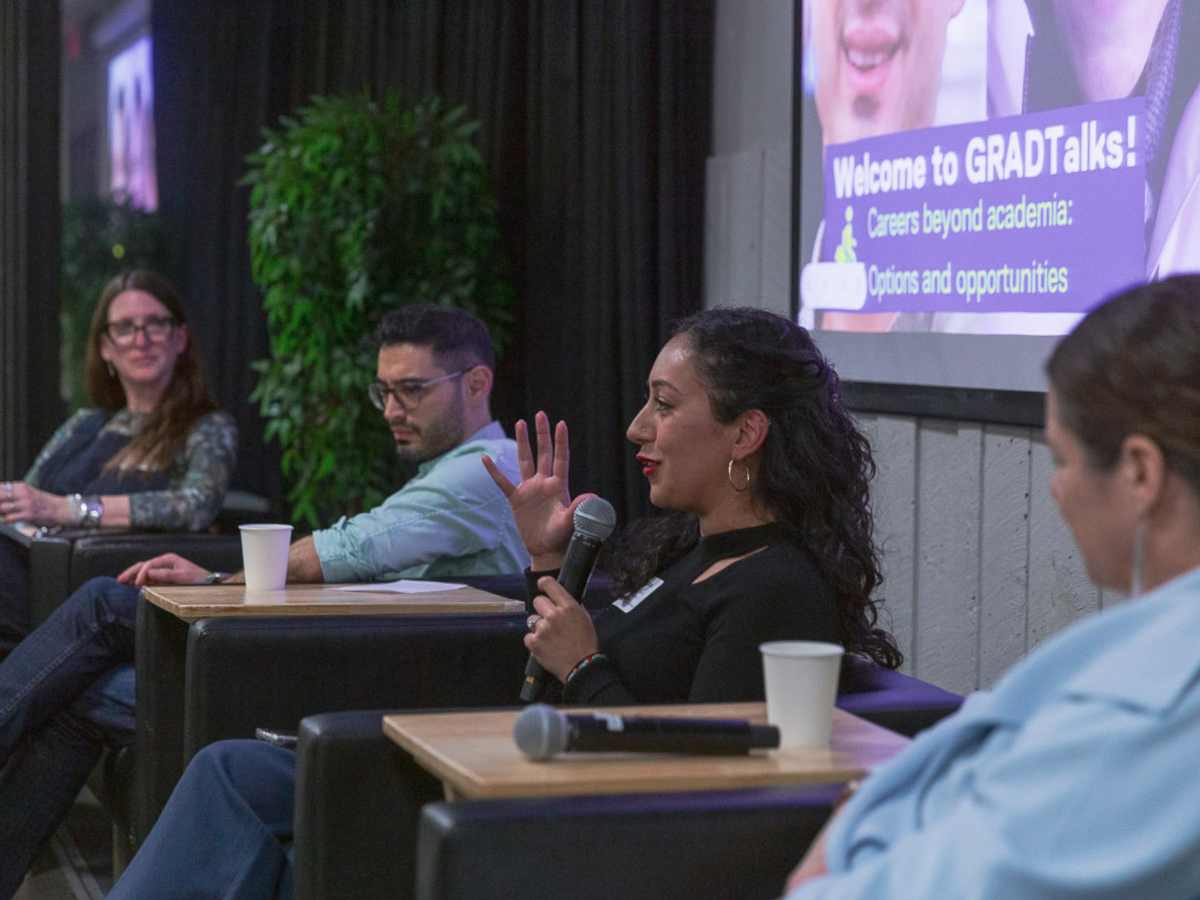Bridging academia and industry

From left: Dr. Nancy Walton, associate dean, student affairs, Dr. Ali Khosousi, Sahar Raza and Dr. Sandra Romain discuss careers beyond academia at GRADTalks.
"The job search process can feel like an emotional rollercoaster. You apply, you get rejected. You apply, you don’t get a response," expressed Dr. Khosousi.
At the recent GRADTalks: Careers Beyond Academia panel discussion hosted by the Yeates School of Graduate and Postdoctoral Studies, Dr. Nancy Walton, associate dean, student affairs, led a candid conversation with Dr. Sandra Romain, medical anthropology PhD alumna and senior policy advisor at Inuit Tapiriit Kanatami, along with TMU graduate alumni Dr. Ali Khosousi, mechanical engineering PhD graduate and senior data scientist at Amazon, and Sahar Raza, communication and culture MA graduate and director of policy and communications at the National Right to Housing Network.
In addition, sometimes financial realities can set in, which can rightfully shift one’s motivation for work. “After spending seven years doing a PhD, I found myself applying for everything because I needed an income," added Dr. Romain. Despite the challenges, graduate students and postdoctoral fellows may find their skills and interests surprisingly well-suited for roles outside academia, as Raza discovered.
“I left academia because I felt the need for action,” noted Raza. “I got it in my thesis but I didn't have enough connections in the community to be an action-oriented scholar so that’s why I joined the non profit sector.”
Dare to fail
“I don’t think there’s anyone who hasn't been rejected for a job or hasn't been ghosted by a recruiter,” Dr. Khosousi remarked.
While job rejection can be disheartening, it's a universal experience that often leads to growth and self-discovery. Whether pursuing a career within academia or exploring opportunities outside of it, success often lies outside one’s comfort zone. Committing to the job search process, seeking feedback and remaining authentic are vital components of personal development, regardless of the outcomes.
Find the right network
"Networking can be more than just a transactional exchange. It's about having genuine conversations with people who share your interests," remarked Raza. This sentiment was echoed by Dr. Romain, who emphasized the importance of embracing discomfort and taking risks in pursuing opportunities. "It takes work and courage to expose yourself to an opportunity that may not yield immediate returns," she added.
Establishing networks with shared interests early in one’s academic journey can provide invaluable insights into professional aspirations. Genuine conversations can lead to unexpected opportunities and broaden understanding of potential career paths. Though a strong network can foster continued development, understanding the unique dynamics of a desired industry is equally important.
Know your industry’s “skills currency”
Demonstrating how graduate education has provided the requisite skills and expertise is key to positioning oneself effectively in the job market. By aligning one’s academic background with the demands of a chosen sector, one can showcase value and stand out to potential employers. “Share and discuss what you bring to the table in the language of a potential employer,” said Dr. Romain.
"In academia publications are considered currency, while in the federal public service project management skills are highly valued," she added. More so than academia, the public sector places greater importance on one's ability to effectively navigate challenges and successfully collaborate with stakeholders. Raza further emphasized the perseverance gained through completing a graduate degree as a valuable asset in the job market.
The journey from academia to industry requires building strategic networks, embracing growth and leveraging academic skills. As Postdoctoral Fellow David Weng pointed out during the Q-and-A, "I want to emphasize the difference between a job and a career. For most of us, we don’t know what we want to do in life full-time. Think deeper and you will find something. If you are sure what you want to do, the whole universe will help you. I think all the answers will come to your heart." By embracing an unwaveringly curious mindset in their career development, grad students and postdocs can build resilience and confidence in the job search process.
GRADTalks interactive speaker series
The GRADTalks series is designed to provide relevant information and professional development resources to enhance the graduate experience at TMU. Speakers highlight the critical importance of graduate education in their professional experiences, inspiring and challenging graduate students to consider career pathways beyond their current degrees.